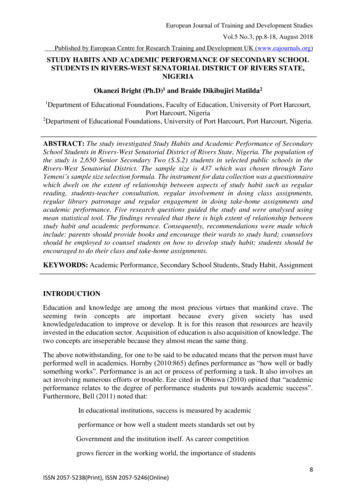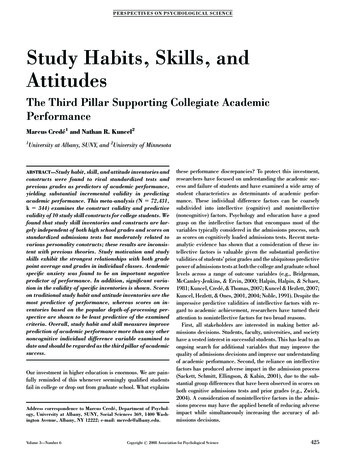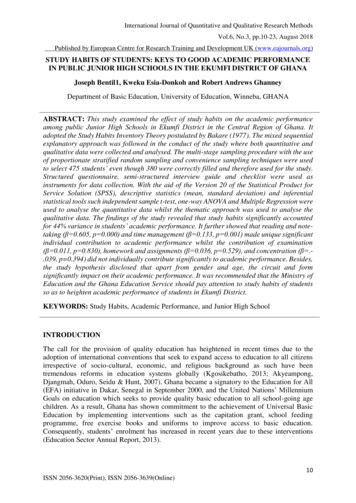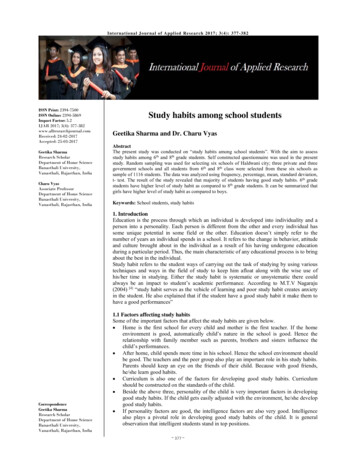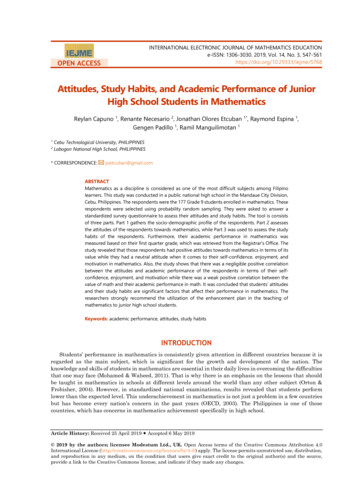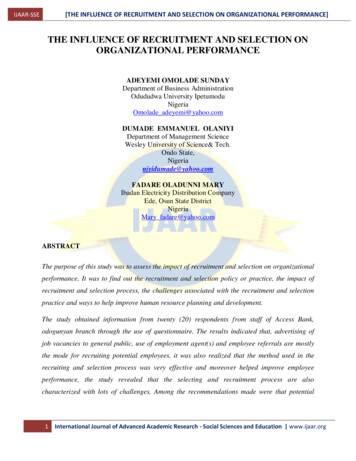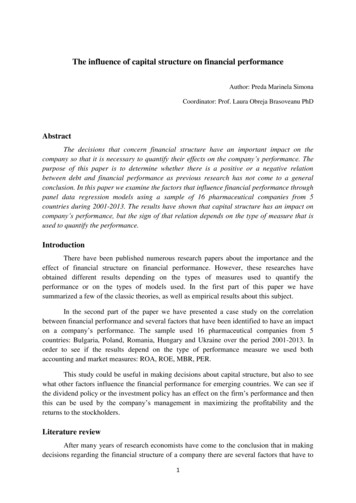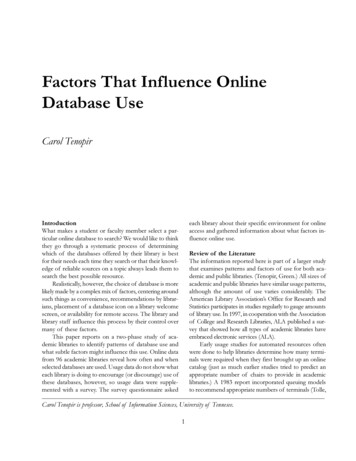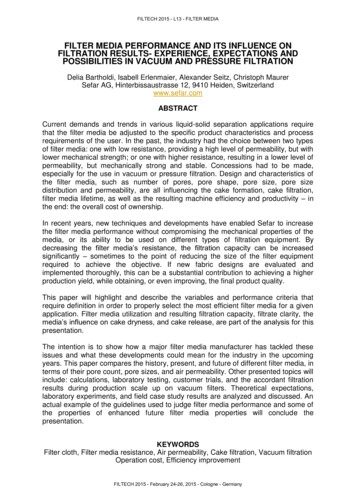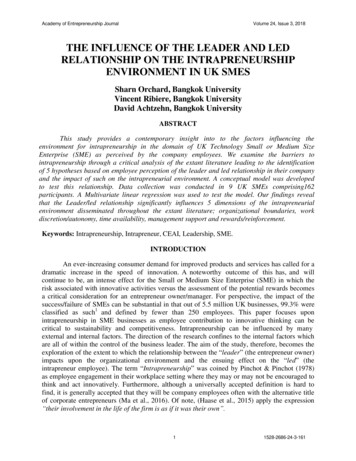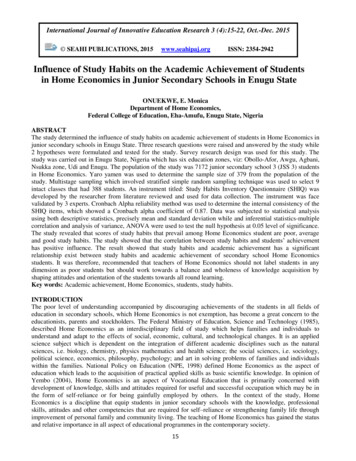
Transcription
International Journal of Innovative Education Research 3 (4):15-22, Oct.-Dec. 2015 SEAHI PUBLICATIONS, 2015www.seahipaj.orgISSN: 2354-2942Influence of Study Habits on the Academic Achievement of Studentsin Home Economics in Junior Secondary Schools in Enugu StateONUEKWE, E. MonicaDepartment of Home Economics,Federal College of Education, Eha-Amufu, Enugu State, NigeriaABSTRACTThe study determined the influence of study habits on academic achievement of students in Home Economics injunior secondary schools in Enugu State. Three research questions were raised and answered by the study while2 hypotheses were formulated and tested for the study. Survey research design was used for this study. Thestudy was carried out in Enugu State, Nigeria which has six education zones, viz: Obollo-Afor, Awgu, Agbani,Nsukka zone, Udi and Enugu. The population of the study was 7172 junior secondary school 3 (JSS 3) studentsin Home Economics. Yaro yamen was used to determine the sample size of 379 from the population of thestudy. Multistage sampling which involved stratified simple random sampling technique was used to select 9intact classes that had 388 students. An instrument titled: Study Habits Inventory Questionnaire (SHIQ) wasdeveloped by the researcher from literature reviewed and used for data collection. The instrument was facevalidated by 3 experts. Cronbach Alpha reliability method was used to determine the internal consistency of theSHIQ items, which showed a Cronbach alpha coefficient of 0.87. Data was subjected to statistical analysisusing both descriptive statistics, precisely mean and standard deviation while and inferential statistics-multiplecorrelation and analysis of variance, ANOVA were used to test the null hypothesis at 0.05 level of significance.The study revealed that scores of study habits that prevail among Home Economics student are poor, averageand good study habits. The study showed that the correlation between study habits and students’ achievementhas positive influence. The result showed that study habits and academic achievement has a significantrelationship exist between study habits and academic achievement of secondary school Home Economicsstudents. It was therefore, recommended that teachers of Home Economics should not label students in anydimension as poor students but should work towards a balance and wholeness of knowledge acquisition byshaping attitudes and orientation of the students towards all round learning.Key words: Academic achievement, Home Economics, students, study habits.INTRODUCTIONThe poor level of understanding accompanied by discouraging achievements of the students in all fields ofeducation in secondary schools, which Home Economics is not exemption, has become a great concern to theeducationists, parents and stockholders. The Federal Ministry of Education, Science and Technology (1985),described Home Economics as an interdisciplinary field of study which helps families and individuals tounderstand and adapt to the effects of social, economic, cultural, and technological changes. It is an appliedscience subject which is dependent on the integration of different academic disciplines such as the naturalsciences, i.e. biology, chemistry, physics mathematics and health science; the social sciences, i.e. sociology,political science, economics, philosophy, psychology; and art in solving problems of families and individualswithin the families. National Policy on Education (NPE, 1998) defined Home Economics as the aspect ofeducation which leads to the acquisition of practical applied skills as basic scientific knowledge. In opinion ofYembo (2004), Home Economics is an aspect of Vocational Education that is primarily concerned withdevelopment of knowledge, skills and attitudes required for useful and successful occupation which may be inthe form of self-reliance or for being gainfully employed by others. In the context of the study, HomeEconomics is a discipline that equip students in junior secondary schools with the knowledge, professionalskills, attitudes and other competencies that are required for self–reliance or strengthening family life throughimprovement of personal family and community living. The teaching of Home Economics has gained the statusand relative importance in all aspect of educational programmes in the contemporary society.15
Onuekwe . Int. J. Innovative Educ. Res. 3(4):15-22, 2015In Nigeria, Home Economics is taught in every school including secondary schools. According to NigerianEducation Research and Development Council (NERDC, 2014), the objectives of teaching Home Economics insecondary schools as contained in the curriculum are to:Ok1. promote an understanding of textile fibres and their uses;2. enable the students to identify various fibres and appreciate the interrelationship between textilesand clothing items;3. promote an understanding of the scientific facts and principles involved in the chemistry oftextiles;4. help students prepare themselves for home and family living;5. provide certain experiences which are preparation for professional homeeconomicsemployment;6. provide the Home Economics education curricula which will qualify the person to meetrequirements of the Arizona State Plan for Vocational Education;7. provide minor programs for students with other majors;8. offer non-baccalaureate terminal functional education of college level;9. provide course requirements for a dietitian and10. provide a major in Home Economics Education at the graduate level.The students in secondary school learn Home Economics to attain the above objectives in secondary schools.Students, in submission of Ormrod (2008), are persons who engaged in course of study and devoted to learningor persons who attend schools or seek knowledge from professional teachers or books. Heyneman (2005)opined that students are people who are enrolled or attend classes at primary schools, secondary schools,colleges or universities. In this context, students are individuals formally enrolled in learning of HomeEconomics in institutions of secondary education. The students are exposed to several activities contained in thecurriculum developed by DERDC to enable them acquire the stated knowledge and skills in Home economics.Most students in junior secondary schools in Nigeria are daily confronted with challenges of coping withacademic achievement under serious emotional strains. The extent at which the above stated objectives of HomeEconomics are achieved by students is represented by their academic achievement in the subject.Academic achievement, in the statement of Wigfield (2002) refers to the knowledge attaining ability or degreeof competence in school tasks usually measured by standardized tests and expressed in a grade or units based onpupils’ performance. Darling, Mcwey, Howard and Olmstead (2007) defined academic achievement as theknowledge obtained or skills developed in the school subjects usually designed by test scores or marks assignedby the teacher. Therefore, in this study, academic achievement is the measure of the knowledge, skills acquiredand attitudes gained by students in Home Economics with regards to the instructional objectives of the subject.The measure is usually obtained from the students with the help of test and mark awarded to the students by theteacher. In addition, the state and federal recognized educational bodies monitor the overall level of students’academic achievement to decide what, when and how a change should be made, if need be, in the educationalsystem base the on students’ achievement. However, the students’ academic achievements are influence byseveral factors. Sabzwari (2004) observed that such factors that influence students’ academic achievementsinclude divorce, family size, economic status of the family, environment factor and students’ factors like studyhabits. Bakare (1977) supported that there are eight key sources of poor academic achievement among whichstudy habit tops other factors. The author stressed that study habit problems are associated with student’sresponse to home work and assignments, reading and note taking, time allocation, study period procedure,student’s concentration, towards examination and teachers’ consultation.Study habit, in the view of Adeyemo (2005), is a pattern of activity that goes beyond merely reading forpleasure. According to the author, it is a well planned and deliberate form of consistency on the part of thestudent towards the understanding of academic subjects. Crow and Crow (1992), asserted that study habits,include plan/place, a definite time table and taking brief of well organized notes. In this context, study habit is awell consistent planned strategy or pattern of studying by students towards apprehension of Home Economics injunior secondary schools. In home economics, the study habits of the students play a vital role in reflecting thestandard of education and the student’s individual achievements. The students may fail to maintain higher levelof achievements due to a particular study habit. It is, therefore, desirable that the students should be motivatedtoward such habits of study by which they may score good grades with better understanding of the subjectmatter in home economics. Sorenseon (1991) stated that in the good basic study habits, one must study with the16
Onuekwe . Int. J. Innovative Educ. Res. 3(4):15-22, 2015primary intention of understanding, which requires one not to hurry in getting through, instead sustainedconcentration and interest. Shafiq (1978) reported that study habit has positive relationship with the learning,which results in better achievements of students in secondary schools. Besides, in English language,OkMathematics, Basic Science and Biology, literature has shown that there is a significance relationship betweenstudents’ study habits and their academic achievement, but there is no empirical evidence on the influence ofstudy habit on students’ academic achievement in Home Economics in Enugu State. It therefore, becomesnecessary to ascertain if there is any relationship between study habits and academic achievement of students inHome Economics in junior secondary schools in Enugu State. Hence, the need for this study.Purpose of the StudyThe purpose of the study was to determine the influence of study habits on academic achievement of students inHome Economics in junior secondary schools in Enugu State. Specifically, the study sought to determine:i.Study habits among students of Home Economics junior secondary schools in Enugu State;ii.The influence of study habit on students’ academic achievement in Home Economics in juniorsecondary schools in Enugu Stateiii.The extent to which the study habits influence students’ academic achievement in Home Economics injunior secondary schoolsResearch Questionsi.What are the types of study habits among students of Home Economics junior secondary schools inEnugu State?ii.What is the influence of stud habits on students’ academic achievement in Home Economics in juniorsecondary schools in Enugu State?iii.To what extent do study habits influence students’ academic achievement in Home Economics in juniorsecondary schools?Research hypothesesi.There is no significant difference in the academic achievement of junior secondary school studentshaving good, average and poor study habits in home economics.ii.There is no significant relationship between study habits and academic achievement of junior secondaryschool students in home economics.Significance of the studyThe beneficiaries of this study are the teachers of Home Economics in secondary schools, the students of HomeEconomics in junior secondary schools, parents and future researchers. The findings of this study providedinformation to the teachers and students on the types of study habits that enhance students’ academicachievement in Home Economics in junior secondary schools. The teachers would use the information to guidethe students on the best study habits to adopt. The students would use the information to adjust on their studyhabits to improve their academic achievement in Home Economics and other subjects. The parents would usethe findings of this study to understand one of the causes of their children’s poor academic achievement inHome Economics. They could also use the information to advice and encourage their children on the type ofstudy habits to adopt for better academic achievement in all the school subjects. The findings of this studywould be beneficial to future researchers as it would serve as a pointer from which other studies could becarried to determine relevant factor that influence academic achievement of students the schools subjects injunior secondary schools.RESEARCH METHODOLOGYThree research questions were developed and answered by the study while two hypotheses were formulated andtested for the study. Survey research design was used for this study. This design was considered suitablebecause the opinions of a representative of respondent (students of home economics) were assessed usingquestionnaire and test. The study was carried out in Enugu state.Area of the estimate populationThe State comprises of six education zones, viz: Obollo-Afor, Awgu, Agbani, Nsukka zone, Udi and Enugu.The State had over 221 junior secondary schools that were offering Home Economics subject. The populationof the study was 7172 junior secondary school 3 students in Home Economics. Yaro yamen was used todetermine the sample size of 379 from the population of the study.17
Onuekwe . Int. J. Innovative Educ. Res. 3(4):15-22, 2015Sampling and sampling techniquesMultistage sampling which involved stratified simple random sampling technique was used to select 9 intactclasses from 3 out of the 6 education zone in the State. The classes were selected 3 from each education zone.OkThe 9 intact classes gave a total of 388 students which was very close to the sample size of 379.Instrument for data col
study habit on students’ academic achievement in Home Economics in Enugu State. It therefore, becomes necessary to ascertain if there is any relationship between study habits and academic achievement of students in Home Economics in junior secondary schools in Enugu State. Hence, the need for this study. Purpose of the Study The purpose of the study was to determine the influence of
